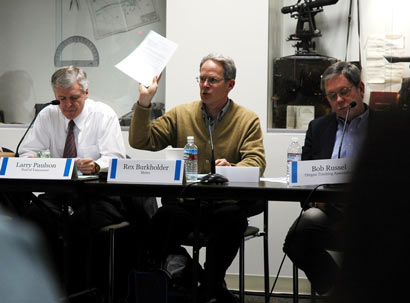
The Columbia River Crossing Task Force has just voted 26-7 in favor of a resolution created by Rex Burkholder, and passed by Metro Council, asking that they include another alternative besides their $6 billion dollar mega-bridge in the next phase of their process.
Burkholder’s resolution was passed as an amendment to the staff recommendation to build a replacement bridge, which passed unanimously. The replacement bridge proposal will now move forward, but a subcommittee, to be chaired by Burkholder, will be formed and will report back to the task force in one month. The subcommittee will explore the supplemental bridge option and come up with a more specific proposal.
[Read an expert analysis on what happened at PortlandTransport.com.]
On the phone after the vote (I had to leave early) Burkholder said,
“The main thing we wanted was unity moving forward.”

Mayor Royce Pollard share a
pre-vote conversation.]
The meeting was packed with movers and shakers from around the region and I noticed many whispered conversations and hallway handshakes. Notable among the crowd were ODOT Director Matt Garrett, Vancouver Mayor Royce Pollard, Metro Councilor Robert Liberty, and Portland City Commissioner Sam Adams.
The tone of the four hour meeting was set by a litany of testimony from concerned citizens opposing the CRC process and their intentions to build an expensive mega-bridge without full consideration of other alternatives.

concerns about the mega-bridge.]
The CRC process has already spent nearly 10 years and $60-80 million dollars to reach this point and it was clear after hearing the public testimony that if they moved forward with their recommendation for a mega-bridge there would be significant controversy and political risk.
Because of this potential controversy, several experts I spoke with tonight said that if the Task Force did not pass Metro’s resolution the result would be that nothing gets built at all.
Noted transportation activist Chris Smith testified that the CRC was being seduced into “building an icon,” and he encouraged the 39 member task force to not focus on this one five mile corridor but to consider spreading the money around like Portland did back in the 1970s when the Mt. Hood Freeway was defeated.
Zoobomber Reverend Phil Sano worked the crowd during his three-minute testimony. He pointed out that the mega-bridge would only encourage motor vehicle use and that “we should fund a project that kills less people,” than the 45,000 people killed every year in motor vehicle crashes.

He then turned to the assembled crowd and said, “Who in this room supports the existing options?” There was silence. And then he asked, “Who hear supports a new option being added?” and there was clapping and whistling.
Shift volunteer and former Boston resident Carl Larson warned that the CRC was headed down the same path as that city’s disastrous “Big Dig” project.
Clark County commissioner Steve Stuart, an outspoken critic of the Task Force’s recommendation, claimed that the proposed mega-bridge would be nearly 228 feet wide. He asked for details on the number of lanes and added that a bridge with 10 motor vehicle lanes, 2 lanes for transit, four shoulders and adequate bike and pedestrians lanes would be “over 2/3 the size of a football field.”

over into another room.]
As I left the meeting, the Task Force was debating the merits of Burkholder’s proposal. Concerns centered around a feeling that vetting this new alternative would take too much time and money from the process. There was a sense from many Task Force members that they could not sacrifice their schedule for any reason.
Jonathan Schleuter of the Westside Economic Alliance was skeptical of Burkholder’s proposal and wanted to move forward without hesitation. He claimed that the materials needed to build a new bridge skyrocket with each passing month. By his estimates he said that,
“It’s costing us $25 million a month just to sit here and have this conversation.”
That contention was countered by Jill Fugilister of Coalition for a Livable Future, Multnomah County Commissioner Serena Cruz Walsh, and others. They said we can either pay a little more now and consider another alternative or pay a lot more later in terms of political and public fall-out for moving forward with only one option on the table that does not allow for “broader voices” to be heard.
On that note, veteran transportation activist Walter Valenta of the Bridgeton Neighborhood Association threw his weight behind Burkholder,
“Let’s give it a month to see if it shakes out. If we can unify around support of an alternative we have more political capital moving forward.”

CRC’s staff recommendation.]
North Portland resident Bill Barnes seemed to sum it all up when I approached him as he left the ODOT building,
“When you got this many normal, ordinary people coming to places like this and letting their concerns be known, you know there’s a problem.”
In the end, there are still many decision yet to be made, but this is an important victory for citizens and transportation advocates who worried that the CRC was about to embark on a controversial project that would not adequately solve the congestion problems on the I-5 corridor between Vancouver and Portland.
Thanks are due to all the citizens who made their voices heard tonight and especially to Metro for finding a solution that nearly everyone could agree upon.
========
UPDATE: More coverage on last night’s meeting:
- PortlandTransport.com the full analysis: Rex in a Box?
- The Oregonian: Replacement bridge study will go ahead
- The Tribune: Smaller I-5 bridge option moves forward

